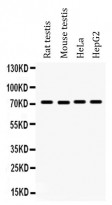ARG41771
anti-FMRP antibody
anti-FMRP antibody for Western blot and Human,Mouse,Rat
Overview
| Product Description | Rabbit Polyclonal antibody recognizes FMRP |
|---|---|
| Tested Reactivity | Hu, Ms, Rat |
| Tested Application | WB |
| Host | Rabbit |
| Clonality | Polyclonal |
| Isotype | IgG |
| Target Name | FMRP |
| Antigen Species | Human |
| Immunogen | Synthetic peptide corresponding to aa. 164-200 of Human FMRP. (ENYQLVILSINEVTSKRAHMLIDMHFRSLRTKLSLIM) |
| Conjugation | Un-conjugated |
| Alternate Names | POF1; Fragile X mental retardation protein 1; FRAXA; Protein FMR-1; POF; FMRP |
Application Instructions
| Application Suggestion |
|
||||
|---|---|---|---|---|---|
| Application Note | * The dilutions indicate recommended starting dilutions and the optimal dilutions or concentrations should be determined by the scientist. | ||||
| Observed Size | ~ 71 kDa |
Properties
| Form | Liquid |
|---|---|
| Purification | Affinity purification with immunogen. |
| Buffer | 0.2% Na2HPO4, 0.9% NaCl, 0.05% Sodium azide and 5% BSA. |
| Preservative | 0.05% Sodium azide |
| Stabilizer | 5% BSA |
| Concentration | 0.5 mg/ml |
| Storage Instruction | For continuous use, store undiluted antibody at 2-8°C for up to a week. For long-term storage, aliquot and store at -20°C or below. Storage in frost free freezers is not recommended. Avoid repeated freeze/thaw cycles. Suggest spin the vial prior to opening. The antibody solution should be gently mixed before use. |
| Note | For laboratory research only, not for drug, diagnostic or other use. |
Bioinformation
| Database Links |
Swiss-port # Q06787 Human Fragile X mental retardation protein 1 Swiss-port # Q80WE1 Rat Fragile X mental retardation protein 1 homolog |
|---|---|
| Gene Symbol | FMR1 |
| Gene Full Name | fragile X mental retardation 1 |
| Background | The protein encoded by this gene binds RNA and is associated with polysomes. The encoded protein may be involved in mRNA trafficking from the nucleus to the cytoplasm. A trinucleotide repeat (CGG) in the 5' UTR is normally found at 6-53 copies, but an expansion to 55-230 repeats is the cause of fragile X syndrome. Expansion of the trinucleotide repeat may also cause one form of premature ovarian failure (POF1). Multiple alternatively spliced transcript variants that encode different protein isoforms and which are located in different cellular locations have been described for this gene. [provided by RefSeq, May 2010] |
| Function | Translation repressor. Component of the CYFIP1-EIF4E-FMR1 complex which binds to the mRNA cap and mediates translational repression. In the CYFIP1-EIF4E-FMR1 complex this subunit mediates translation repression (By similarity). RNA-binding protein that plays a role in intracellular RNA transport and in the regulation of translation of target mRNAs. Associated with polysomes. May play a role in the transport of mRNA from the nucleus to the cytoplasm. Binds strongly to poly(G), binds moderately to poly(U) but shows very little binding to poly(A) or poly(C). [UniProt] |
| Cellular Localization | Nucleus; Plasma membrane. [UniProt] |
| Calculated MW | 71 kDa |
| PTM | Phosphorylated (PubMed:14532325). Phosphorylated on several serine residues. Phosphorylation at Ser-500 is required for phosphorylation of other nearby serine residues. Phosphorylation has no effect on the binding of individual mRNA species, but may affect the association with polyribosome. Unphosphorylated FMR1 is associated with actively translating polyribosome, whereas a fraction of phosphorylated FMR1 is associated with apparently stalled polyribosome. Dephosphorylation by an activated phosphatase may release the FMR1-mediated translational repression and allow synthesis of a locally required protein at snypases (By similarity). Monoubiquitinated. Polyubiquitinated. Ubiquitinated and targeted for proteasomal degradation after activation of metabotropic glutamate receptor (mGluR). Methylated; methylation is necessary for heterodimerization with FXR1, association with polyribosomes, recruitment into stress granules and translation of FMR1 target mRNAs (PubMed:16636078). Methylated by PRMT1, PRMT3 and PRMT4, in vitro (PubMed:16922515). Isoform 10: Undergoes proteolytic cleavage; may be specifically cleaved by calpain-1/CAPN1 in cajal bodies (PubMed:24204304). [UniProt] |
Images (1) Click the Picture to Zoom In






